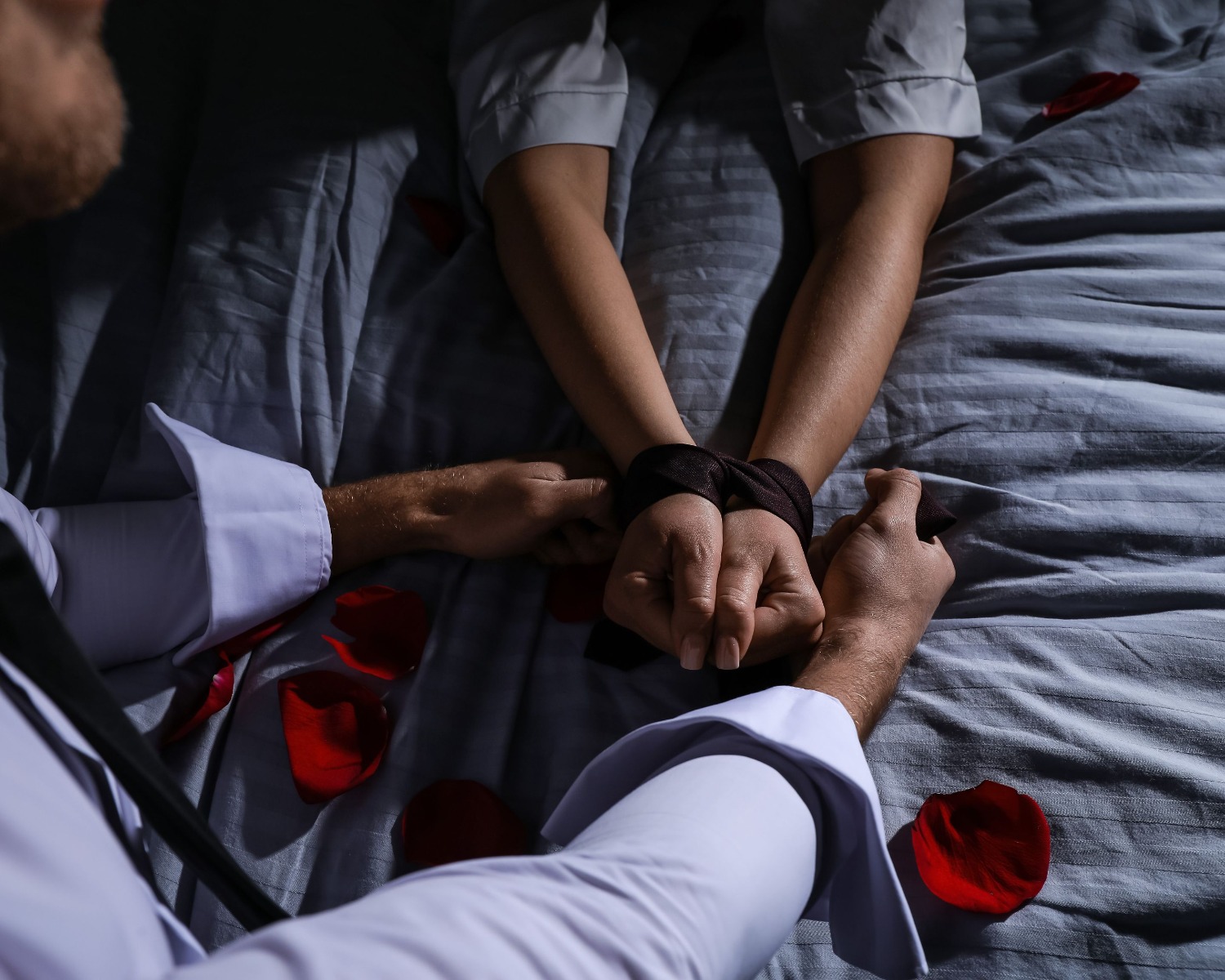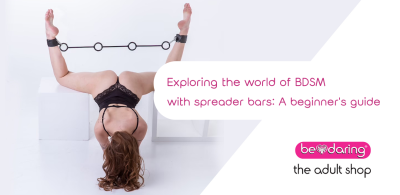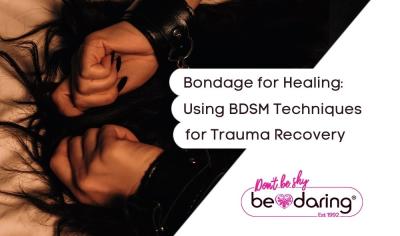Effective Safe Words To Use During Your Next BDSM Scene

What Is a Safe Word?
When engaging in kink or sex activities, a safe word is a phrase or word that you may use to signal that you need to stop for the time being. It could stop the play completely. What if you are unable to speak? - A safe word does not have to be a word, especially if you are tied or otherwise unable to communicate. For this reason, some people use the term "stop mechanisms," which include safe phrases and other techniques to pause play.
Why Do People Use Safe Words?
A safe word is a simple way to express how you're doing with your spouse. Typically, a safe word is used to pause play, enabling you to check in and make corrections before restarting or terminating play altogether if anything goes wrong that cannot be fixed. Some people strive to avoid using safe words, possibly because they want to appear tough, don't want to disappoint their partner, or believe they should only use safe words in an emergency. But this is not the case! Safe words can be used in a wide range of situations:
- The scenario does not feel like you planned.
- Play evokes bad sensations or trauma.
- A medical concern.
- Cramps or other discomforts.
- The action is too strenuous.
- Your partner violated your consent.
Of course, you're not required to use your safe word in all of these instances. You may remark something like, "Hey, the rope has struck a pressure point. "Could you move it?" However, if you require an instant adjustment, employing a safe word is a viable choice.
Finally, while safe words are typically linked with BDSM, they may also be used for "vanilla" sex. Sure, sex may be less harmful than kinky activities in some respects, but it is not without risk.
As with other things, it is better to be safe than sorry. There is no harm done if you select a safe term and never use it. However, without a safe word, anything horrible may happen while playing, and you won't be able to explain it clearly.
Who Can Use a Safe Word?
When we talk about a safe word, we usually refer to the submissive partner using it to tell the dominant partner to halt an action. However, this does not imply that only submissives may utilise safe terms. Go in-depth: How to be powerful and submissive in the bedroom.
Dominants can and should employ safe language when necessary. This might indicate that they are battling with guilt or shame about what they are doing to their partner (which can occur as a result of dom drop) or that they have triggering memories from previous traumatic encounters. The dynamic may alter slightly if the dominant uses a safe word, but the goal remains the same: to halt, regroup, and only continue play if everyone is okay.
Safe Words In BDSM
Many people are familiar with the term "safe words" from BDSM, which can refer to acts such as blood play or suspension, which are more dangerous than regular sexual activity.
Consensual non-consent - Safe words are especially important in consensual nonconsent (CNC) situations when one partner may struggle or resist. In such scenes, stating "No" does not necessarily imply "No." A safe word clearly communicates to your partner that you are not speaking anything as part of the BDSM role.
Safe words in long-term relationships - Some people believe that long-term partners or total power exchange (TPE) relationships do not require the use of safe language. True, if you know your spouse extraordinarily well, the probability of needing a safe word may be reduced.
You possibly also have other means to communicate that might be used instead of a safe word or the stop mechanism. However, we encourage that long-term partners use safe language.
They say I don’t need a safe word - As a side note, if you're a submissive and your dominant partner claims you don't need or can't use a safe word, you should reevaluate your activities with them. Any individual who understands the risks and responsibilities associated with kink should be OK with you wishing to utilise a safe word while adhering to other BDSM norms.
Safety philosophies
In BDSM, safety is of the highest importance, hence there are different safety theories.
SSC stands for "Safe, sane, and consensual." This phrase emphasises consent in a healthy state of mind, as well as avoiding acts that are unsafe. It is the most well-known and oldest of these theories, having been developed in 1983 [1]. However, some individuals believe that the inclusion of "sane" is discriminatory towards persons with mental illnesses.
Rack, also known as risk-aware consensual kink, recognises that no kink is completely risk-free, hence nothing is fully safe. As a result, everyone is responsible for being aware of the danger. Of course, permission remains crucial.
Finally, PRICK elevates the experience by emphasising personal responsibility and informed, consensual kink. If you follow this procedure, you accept responsibility for informing yourself about the possible danger of any action to you or your partner.
While some individuals hold strong beliefs about many ideologies, you are not required to adhere to any of them. They aren't always mutually exclusive. Consider these guidelines and remember the purpose: minimising danger, doing the right thing by your partner, and being knowledgeable about the activities in which you engage.
Negotiation
Negotiation occurs before to a scene, BDSM game, or beginning a relationship. Now, while "negotiation" may seem quite organised or rigorous (up to a full-fledged BDSM contract), it does not have to be. It might be a verbal agreement on what you want to do, what you don't want to do, medical information, safe words, and any other worries or information that will be useful when playing with you.
An example of a quick way around this may sound like this:
"I accept to be bound in any position, barring suspension and blindfold. Be cautious with my right shoulder, as I have an old ailment that flares up. I can get panic episodes in enclosed situations. I'm alright with spanking and paddling, but not whipping, caning, or other forms of impact play. I am allergic to latex and keep an epi-pen in the top drawer of my nightstand. My safe word is "red." My ideal aftercare consists of a glass of water, a blanket, and some quiet time.
Some people prefer to discuss the worst-case scenario, which is typically a medical emergency. So you may talk about what to do if you harm yourself, go unconscious, have a seizure or allergic response, or anything else. You may include your:
- Preferred Hospital
- Doctor's phone number
- Insurance carrier and emergency contact information.
- This might sound pretty extreme, but it’s always better to be safe than sorry.
Tips For Choosing a Safe Word

The most critical aspect of picking a safe word is discussing it with your spouse. After all, how can someone recognise and respond to your safe word if they have no idea what it is or what it means?
And if you use more than one safe term, explain what each one implies. Don't assume that simply because you use a popular safe phrase or a system, such as the traffic light system below, that each word has the same meaning for everyone. Discuss it with your spouse - You should also discuss what happens if someone uses the safe word. Although you should at least halt play and check in with your spouse, the more detailed you are, the more likely you or your partner will have their needs addressed at a critical moment, reducing the possibility of injury.
It should be easy to say— We've given a list of suggested safe phrases below, but if you create your own, make it simple to pronounce and hear. You might wish to avoid terms that rhyme with "Yes" or "No," as they may already be used in a BDSM scenario or sex session. However, a partner assuming you've used a safe word and checking in is far superior to them missing you calling out your safe word.
Unusual, unsexy, and hilarious safe words work well. Similarly, use terms that would sound bizarre or unexpected if used during sex or BDSM. Some individuals choose unsexy terms or names because they destroy the mood and make it easy to notice you're in discomfort and cease the activity. Although it is not a hard and fast rule, you are not required to use a sexy safe word. You just want one that works.
For the same reason, a hilarious safe phrase may be appropriate if it makes you laugh and breaks the scenario, enabling you to concentrate on each other's safety and security.
You can debate safe word examples with your spouse to choose the best safe word for you as a pair, or choose one from our list below. Just make sure to address it before you play!
Traffic Light System

The traffic light system is a popular safe word strategy because it is easy to grasp. You are not need to employ the traffic light method while selecting a safe word, but if it works for you, go ahead!
This approach employs three distinct phrases that correspond to the colour of traffic lights: red, yellow, and green. Although most people believe that red is a total stop word, and that you should stop playing, check in, and maybe continue to aftercare, there is considerable ambiguity about the other two colours.
For example, yellow can signify:
- You are nearing your limit and will soon use your safe word, so your partner should slow off or prepare to quit.
- You're nearing your limit and should use your safe word, but you don't want to speak it.
- You can maintain this level of intensity but do not want it to escalate.
- Similarly, green may represent a variety of things!
- Everything is fine at this level, and you don't want it to change.
- You're good; your partner can boost the ante.
Discuss the meanings with your spouse beforehand. With so many diverse meanings, it's clear why you should be entirely open with your partner before arranging a scenario!
Some people use different colours to transmit additional information to their relationships. For example, sex instructor Sunny Megatron explains how the colour blue might indicate a medical concern, alerting you to the gravity of the situation.
Aside from the use of numerous phrases, the traffic light system distinguishes itself from other safe words by including a "everything's okay" indicator. Obviously, someone may cry out "Yellow" or "Red" at any moment, but do people yell "Green" all the time while they're having fun?
Not really. In fact, some people may not actually utilise green at all. However, one approach is to check in with your partner, especially if you haven't played together before, are attempting something new, or are playing more intensely than normal.
All you need to do is ask, "How are you?" Or "Are you okay?" If your companion responds with a cheerful or dreamy "Green," you're set to go.
Choosing Non-Verbal “safe words” for Couples
So far, all of our recommendations for sexually safe phrases have centred on spoken or spoken terms. But what happens when you're wearing a gag and unable to speak? Or maybe you want some safe word suggestions for when your brain and tongue aren't cooperating to make words.
Remember that some persons are unable to talk or hear at all, therefore they require an alternative that does not entail saying a safe phrase. If you or your partner are tied up, you may have restricted mobility or be unable to use both hands, therefore anything that just takes one hand is the greatest safe word option in those situations.
The more obvious your stopping mechanism, the better. Otherwise, your spouse may miss the signal.
Can You Practise With a Safe Word?
The quick response is, "Yes!" In fact, we strongly encourage it if you're new to playing with a partner or feel your companion would be hesitant to use their safe word.
So, how do you do it?
You have a situation where the goal is for your partner to say their safe word. They'll be fully aware of this. You're not aiming to go so hard that your partner needs to use their safe word, and it doesn't have to be particularly intense.
Instead, create a scene in which you are tenderly stroking your lover, mildly paddling them, or making love. Next, advise your companion to use their safe word.
They probably won't want to since they appreciate what you're doing together, but that's the goal. They will still utilise it to satisfy you, just as they would for submissive chores.
If they can use their safe word while everything is going well, they are far more likely to be able to use it when a glitch occurs.
Similarly, you may not want to quit doing something you like, but you must demonstrate that you respect your partner, their safe word, and limits, which is ultimately what using a safe word entails.
Of course, if your spouse follows your directions, you should praise them for their good behaviour. That might be anything from continuing where you left off, giving them a blow job, dining them out, or providing another special pleasure. Why not say something pleasant and ignite their praising kink?
Once you're satisfied that your partner will use their safe word, you may move on to true BDSM, kinky sex, or more intense sex activities. However, you may always repeat this exercise to ensure that your spouse can use their safe word.
How to Respond When Someone Uses a Safe Word
Before you begin playing or having sex, you should talk with your partner about what to do if one of you says a safe word. If you haven't, remember this:
Stop.
Stop the action, whether it's penetration, tie-ups, impact play, or something else. This allows you to check in with your spouse, which may be as basic as asking, "Are you okay?" and "What's the matter?"
If your spouse is gagged and has employed a stop device, remove the gag so that they may talk.
You must try to respond if you’re the one that used the safe word.
This is important information for your spouse to know so that they can judge the severity of the problem.
If you do not wish to explain why you used your safe word, you are not required to do so. You can cease play for any reason. However, if you want medical attention or an adjustment, you should clearly request it from your spouse.
Allow them time to answer - On the other hand, keep in mind that your partner may be in an altered state of consciousness, such as subspace, or that they have exhausted all of their capacity to express their safe word or technique. They may also need to stretch their jaw muscles if they have been gagged for an extended period of time. Give them time to answer and observe their body language and behaviours. Are they breathing heavily, sweating profusely, bleeding, or otherwise clearly distressed?
Of course, your partner may not utilise a safe word due to a physical issue, as stated above, but check for any indications that things are different from your regular BDSM or sex sessions. Be prepared for your partner to faint or be unable to support themselves, so assist them in arranging their body comfortably on the floor, bed, or another piece of furniture. This might entail untying or removing them from bondage. If it's definitely an emergency, use safety scissors to sever the bindings.
You may need to assist them in dressing for medical care if it is an emergency. If you've previously addressed worst-case situations, you could be familiar with your partner's insurance information, which might be useful.
Time for aftercare - If there is not an emergency, but your spouse refuses to engage in sex or play, it is time to provide aftercare--if they want it. Respect the preferences of those who do not want or require aftercare.
Cuddling, a nourishing lunch or drink, or enveloping them in blankets are just a few examples of aftercare practices that assist people regain their balance.
If Your Safe Word Is Ignored
I hope this never happens to you. Your spouse should always choose your safety and protection over their desire for kink or sex.
Ignoring your safe word indicates that a boundary was broken. Some argue that using your safe word is a form of withdrawing permission, thus if your partner continues, the behaviours are no longer consensual. It's an assault.
You have every right to repeat your safe word, get out of the situation (if possible), and leave. Advocate for yourself, but make sure you're safe. You are under no obligation to play, have sex, or maintain a connection with anyone who has ignored your safe word. Is using a safe word the only time you should stop?
No.
You should absolutely halt if your partner says their safe word, but it isn't the only time you should end a kinky sex session or BDSM scenario.
You should always pay attention to their physique and the sounds they produce. Weakness, feeling dizzy, eyes rolling to the back of their head, slurring their words, and hyperventilating are all indications that you should stop, even if your partner has not used their safe word.
disregarding any indicators of anxiety, including disregarding your partner's safe word, is not just selfish; it might be fatal—and illegal.
Nonverbal safe words (Stop Mechanisms)
- Dropping the ball
- Blinking a pattern, akin to Morse code
- Snapping
- Shaking a bell (a cat toy works).
- Waving a scarf or flag.
- Clapping
- Humming a familiar tune, such as "Twinkle Twinkle Little Star"
- Finger gestures for clapping
- Tapping out (two rapid, forceful taps are easily understood).
- Grunting
- Knocking or striking on something
- Clicking your fingers
With these suggestions for safe words and stop mechanisms, you may enjoy kink, BDSM, rough sex, or any other bedroom activity. Of course, these activities still include some amount of danger, but discussing safe words, among other things, ensures that you are prepared if something goes wrong.































